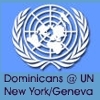

| BRIEFING - March 9 , 2011 | To learn more about the Millenium Development Goals click on the graphic
| |||
Report on the Commission on the Status of Women
The annual meeting of the Commission on the Status of Women took place here in New York from Feb. 21–March 4. Each year, the commission reviews an element of the Beijing Platform for Action (September 1995). This Platform highlights education as a human right and an essential tool for achieving the goals of equality, development and peace, and urges Governments to eliminate disparities between women and men in access to education at all levels. It also emphasizes the need to develop policies and programs to enhance the employability of women and their access to quality jobs. The importance of addressing gender stereotyping as one of the root causes of occupational segregation is also emphasized. In this spirit, the priority theme of this year’s commission was access and participation of women and girls in education, training, science and technology, including for the promotion of women’s equal access to full employment and decent work. It is a widespread belief that education, gender equality and the empowerment of women are indispensable elements for holistic social development and positive social change. They are at the heart of the Millennium Development Goals, and are preconditions for overcoming poverty, hunger and disease. Goal 2 and 3 of the MDGs are, respectively, to achieve universal primary education; and, to promote gender equality and empower women. But while substantial progress has been made, gaps remain in women’s and girls’ access to both education and decent employment. Women comprise nearly two-thirds of the world’s 759 illiterate adults, and poverty remains a key obstacle to both women’s and girls’ prospects for education and vocational training. For primary education, the steepest challenges are found in Oceania, sub-Saharan Africa and Western Asia, while in secondary education, the gender gap is most evident in regions where enrolment is lowest—sub-Saharan Africa, Western Asia and Southern Asia.
Poverty puts girls at a distinct disadvantage. In many parts of the world, girls are forced to spend hours fetching water and firewood, and often do not attend school because of the lack of decent sanitation facilities, as well as the cost of transportation and books. The prevalence of HIV/AIDS in parts of the developing world has all-too-often thrust girls into the role of primary care-giver, making the prospects for an education, no less decent employment, next to impossible. Girls are also the victims of exclusion, exploitation and violence, and are frequent and deliberate targets of rape and abduction. Lack of access to education and adequate health care, sexual abuse, early marriage and child-bearing impede their full development and deprive millions of girls of the opportunity to play a productive role in their societies. In their marvelous book, “Half the Sky: Turning Oppression Into Opportunity for Women Worldwide,” authors Nicholas D. Kristof and Sheryl WuDunn contend that “…in this century the paramount moral challenge will be the struggle for gender equality around the world.” Clearly, investment in the education of girls may well be the highest return investment available in the developing world. At the Conference on Gender Parity in Education, held in Washington, D.C. in March 2005, then Secretary General of the United Nations Kofi Anan said, “If we are to succeed in our efforts to build a healthier, more peaceful and equitable world, classrooms must be full of girls… By educating girls, we will trigger a transformation of society as a whole…” The nations of the “developed” world would make a significant contribution toward this more peaceful and equitable world by following through on their commitments to the internationally agreed upon development goals, including the MDGs, which place the education and empowerment of women and girls at its very core. During the commission, there were a number of side-events sponsored by various NGOs. Jacqui Ryan, our Dominican Sister from New Zealand, attended several, and will share a bit with you, in her own words:
While these examples may seem distant from the first part of this briefing, one needs to consider that if women and girls continue to be violated through sexual exploitation and oppression—both in peace and armed conflict, and unable to have their voices heard at national and international level, there is little chance of achieving gender equality. Access to health and education, technology and training can only occur if women and girls are given the opportunity of life, in the first instance, and then equitable access to those resources in their families, communities and nations which will allow them to live as whole human beings, “free and equal in dignity and rights” (UDHR/UN).
|
Dominican Leadership Conference
Building relationships and collaborating in the mission of preaching the Gospel
29000 West Eleven Mile Road
Farmington Hills MI 48336
248-536-3234 Contact: Executive Director
